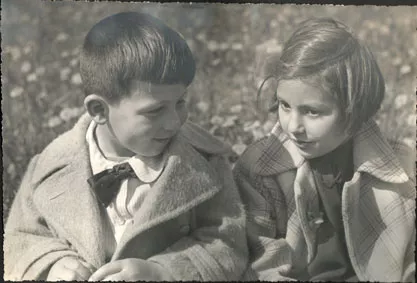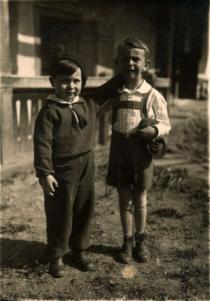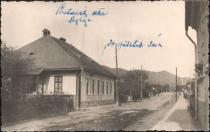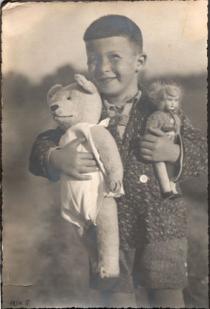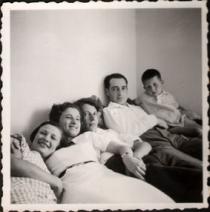This is Janos Gottlieb and Agnes Hirsch. I’m five years old, and I’m with Agi Hirsch, a girl from Marosvasarhely, who was spending her holidays in Nagybanya, and we spent the summer together.
She came to visit a relative, but she visited us as well. We had a good apartment, it wasn’t ours, but the house was surrounded by a nice garden, and my father [Laszlo Gottlieb] took the photo there.
My father was a great photographer, he even had his own studio at home.
I was born in 1929 in Nagybanya. From the age of three I lived at my paternal grandparents.
My grandparents lived in a village somewhere near Nagybanya for a while, I was with them there too, then in Nagybanya.
But when I was five years old, my father took me with him, he rented a quite nice apartment, in a nice part, let's say, of Nagybanya, in a villa.
The owner was a woman from Kolozsvar, a widow, her family name was Herczeg.
The rent was quite high, but it was in the outskirts, the air was fine there.
My father always feared that I got tuberculosis or something like that. This was when I was five.
We had somebody who did the housekeeping; my father had a good salary, in those times this didn't mean a problem.
Later it was my step-mother who did the housekeeping. Well, it wasn't her who actually worked, but she gave out the tasks for everybody.
It wasn't her who did the cooking, we had a cook. This wasn't a problem.
My sole problem during my childhood was that I was orphan. Yet I didn't feel so motherless, because they behaved so nicely with me.
My father was not only a daddy, but a mom too. He looked after me in a very kind manner, not to speak about his parents, especially about my grandmother.
Later my second mother, whom I loved a lot, took care of me very gently too.
I called her by her name, Lili. I had a very beautiful childhood. The environment and the people were all very nice.
God knows how it worked back then, but I did have all kind of friends: Jews - but just a few -, Hungarians, Romanians.
We got along well with everybody, we mixed with everybody; nationality or religious affiliation didn't mean a problem. Nationality and religion was everyone's own business.
Especially after I learnt Romanian at the age of six, being in contact with Romanian children didn't have any obstacles.
I was very distressed when I saw they were instigating people of different nationality against each other - for this is the truth.
I experienced incitement in my childhood already.
There were Hungarians, who were against Romanians, and Romanians, who didn't like Hungarians.
I don't know why, because one can not be against one nation.
You can be against a person, yes, but not against a nation.
That's it. And anti-Semitism started to be present in the 1940s, I was already eleven years old.
I had Hungarian friends, I even had friends who came to Nagybanya from Hungary, when North-Transylvania belonged to Hungary, and I got along well with them too, there wasn't any problem.
I couldn't say they were anti-Semite. However, there were people who always talked badly of Jews.
